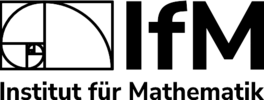Informations for pupils
Why study mathematics?
The most important prerequisite is an interest in mathematical content, problems and considerations. In addition, the same is required as for any other degree: diligence, perseverance and a critical attitude, also towards oneself. However, no other degree programme requires as little rote learning as mathematics; what is needed here is an understanding of contexts and backgrounds.
Mathematics
Mathematics is one of the key disciplines of our modern society. It offers versatile methods for theory development, analysis and understanding, modelling and simulation, prediction and control of processes in technology, life sciences, medicine, economy and society. Its strengths lie in structural and conceptual clarity and the clarity gained through abstraction, as well as its broad applicability. It is therefore no coincidence that mathematicians work in a wide variety of sectors and institutions (see also the page on studies and careers). The career prospects for mathematicians remain excellent. The Master's degree in mathematics also forms the basis for a doctorate in mathematics.
The study of mathematics imparts fundamentals and methods that are important in theory, application and profession. Structures and methods of linear algebra, analysis, stochastics, algebra and numerics are therefore essential subject content at the beginning of the degree programme. Further and more in-depth courses build on this, enabling you to work independently in a research and application-oriented mathematical field of your choice.
Teacher training in mathematics
The study of mathematics in the two-subject Bachelor's programme offers you training in the fundamentals of the subject, which are important in theory, application and profession. Structures and methods of linear algebra, analysis, stochastics and algebra are therefore essential subject content of the programme. In addition, there is an introduction to problem solving, a specialisation in a mathematical field of your choice, a seminar and subject didactics. This provides access to the content, methods and didactics of modern mathematics in application and research. Special profile features of the programme are the emphasis on practical relevance and application, both in the subject itself and in its subject didactics.
Good prerequisites for successful study are the enjoyment of solving problems and logical and structural thinking, as well as geometric imagination. In addition, there should be the willingness to overcome difficulties through one's own efforts and the joy of communicating with experts in other fields of knowledge, with lay people and especially with learners.
Why study in Oldenburg?
The Institute of Mathematics in Oldenburg is characterised by a positive learning atmosphere and dedicated teaching staff. This is reflected in particular in an excellent relationship between students and lecturers. A special feature of Oldenburg's mathematics programme is the range of innovative courses on offer, which make it easier for you to start your studies.
The Institute of Mathematics has three main research areas (Mathematical Structures: Theory and Applications, Mathematical Models in Economics and Natural Sciences, Mathematical Educational Research and Instructional Development), each of which is supported by active, internationally successful research groups. The connection to current mathematical research also ensures that the study contents are continuously adapted and critically reviewed. In addition, the research groups offer the opportunity to come into contact with current research topics already in the course of your studies (e.g. in the context of your Bachelor's or Master's thesis).
Where can I get more information?
If you have questions about studying mathematics, please contact the lecturers by e-mail or via the office hours (see list of persons), or find out who you should contact on the page Representatives of the Institute of Mathematics in Study Matters.
A special opportunity for information is the Mathematics Day, which is held regularly at the Institute (see the Calendar of Events). There is also the possibility of holding information events on mathematics studies at schools
-->



